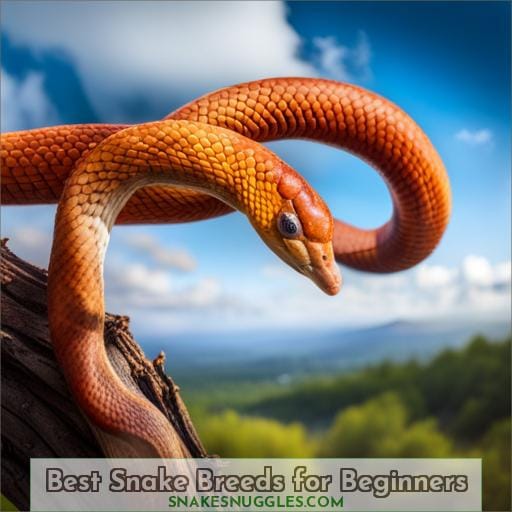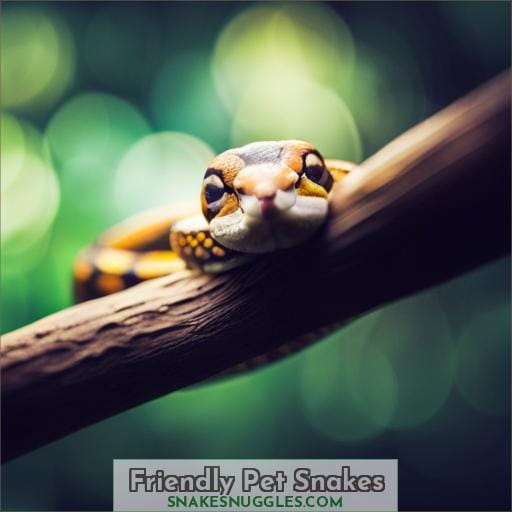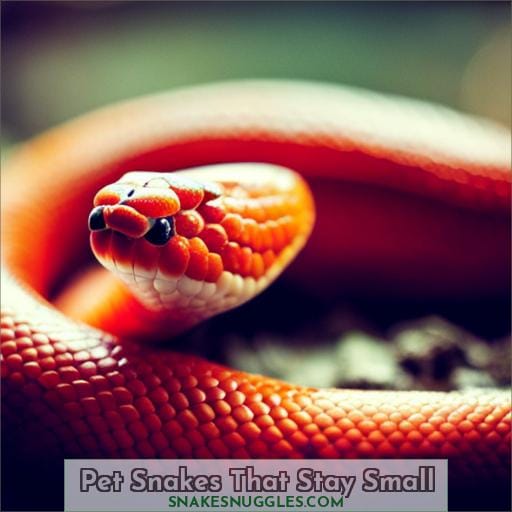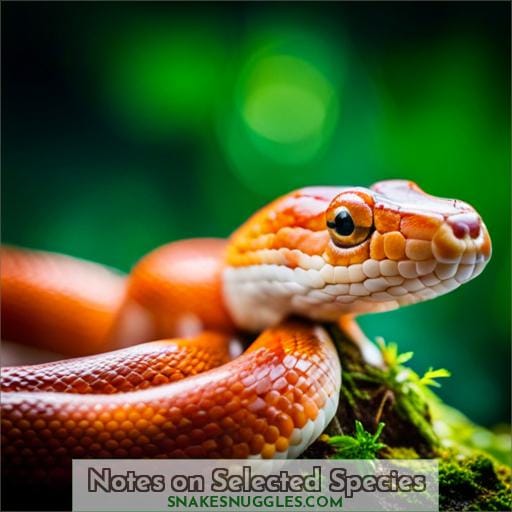This site is supported by our readers. We may earn a commission, at no cost to you, if you purchase through links.
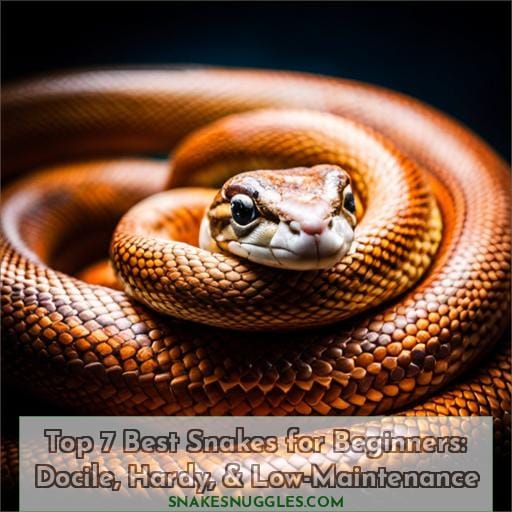 Whether you’re a first-time snake owner or just looking for a low-maintenance pet, these seven snake breeds are perfect for beginners:
Whether you’re a first-time snake owner or just looking for a low-maintenance pet, these seven snake breeds are perfect for beginners:
- Corn snake
- Ball python
- Milk snake
- Garter snake
- Kingsnake
- Rosy boa
- Sand boa
Table Of Contents
Key Takeaways
- Corn snakes
- Ball pythons
- Rosy boas
- Garter snakes
- Brown snakes
Best Snake Breeds for Beginners
If you’re a beginner snake owner, there are several breeds that are perfect for you.
- Corn snakes
- Ball pythons
- Rosy boas
- Garter snakes
- Brown snakes
These breeds are known for their docile nature and low maintenance requirements, making them ideal choices for first-time snake owners.
Corn Snakes
If you’re a beginner looking for a docile, hardy, and low-maintenance snake, corn snakes are an excellent choice.
Here are five reasons why corn snakes are great beginner snakes:
- They’re docile and easy to handle.
- They’re hardy and adaptable to a variety of habitats.
- They’re not picky eaters and will accept live or frozen-thawed prey.
- They’re escape artists and good climbers.
- They’re relatively inexpensive to buy and maintain.
Ball Pythons
Ball pythons are one of the best snake breeds for beginners, as they’re docile, hardy, and rarely present feeding difficulties or health problems.
When it comes to caring for ball pythons as hatchlings or adults, providing a suitable habitat with proper temperature and humidity is essential. Feeding them mice or rats on a regular schedule ensures their nutritional needs are met.
Rosy Boas
A rosy boa is a great option for a beginner snake owner because they’re docile, hardy, and rarely present feeding difficulties or health problems.
They’ve a lifespan of up to 25 years, eat live mice, and should be handled every few days.
They can be kept in a 20-gallon tank.
Garter Snakes
Garter snakes are familiar to almost everyone who’s spent time outdoors in North America.
They make great pets for beginners and have a life span of 4-7 years, are docile, good with children and easy to care for.
Brown Snakes
Brown snakes are another docile, hardy snake that are perfect for beginners.
- Native to North America
- Good climbers
- Eat small rodents
Friendly Pet Snakes
For a friendly pet snake, look for a species that’s docile and enjoys being handled.
Some good options include:
- Green snakes
- House snakes
- Ringneck snakes
- California king snakes
- Gopher snakes
These snakes are all relatively easy-going temperaments, rarely bite, and are good with children. They also require relatively low-maintenance care, making them a great choice for first-time snake owners.
Pet Snakes That Stay Small
If you’re looking for a pet snake that will stay small, consider a:
- House snake
- Ringneck snake
- Sand boa
These snakes are all relatively docile and easy to care for, and they reach a maximum length of only a few feet.
House Snakes
As a result of their mild, easy-going temperaments and small size, house snakes make great pets for beginners.
They’re easy to care for, docile, good with children, native to North America, low-maintenance, rarely get sick, and have a long lifespan.
Ringneck Snakes
If you’re looking for a small and low-maintenance pet snake, consider the Ringneck Snake.
They’re docile, have a colorful appearance, and are native to the United States.
Plus, they’re easy to care for and only grow to about 2 feet long.
Sand Boas
Looking for a pet snake that stays small and is perfect for beginners? Consider sand boas. They’re docile, hardy, rarely present feeding difficulties, and good with kids. Plus, they’re easy to care for and have a small size.
| Feature | Sand Boas |
|---|---|
| Size | Up to 2 feet long |
| Temperament | Docile |
| Habitat | Deserts and grasslands |
| Diet | Mice, rats, lizards |
| Lifespan | Up to 20 years |
Pet Snakes That Don’t Eat Mice
If you’re a beginner snake owner looking for a pet that doesn’t eat mice, there are several options to consider.
- Garter snakes
- Water snakes
- Ringneck snakes
- Brown snakes
- Green snakes
These species have different sizes and temperaments but share the common trait of not requiring mice as part of their diet.
Garter and water snakes are typically smaller in size compared to ringneck or brown snakes which can grow larger.
In terms of care, these non-mice eating pet snake breeds require similar conditions such as appropriate housing with proper temperature and humidity levels.
Their lifespan varies depending on the specific species but generally falls within 15-25 years with proper care.
So if you prefer a snake that doesn’t eat mice but still want an interesting reptile companion to take care of over many years, one of these options might be just right for you!
Notes on Selected Species
Corn snakes are docile, hardy, and rarely present feeding difficulties or health problems.
Docile
In addition to being small and not requiring live prey, garter snakes are docile snakes that rarely present feeding difficulties or health problems.
– Hardy
Hardy snakes are ideal for first-time snake owners.
They live in a variety of climates, eat a variety of foods, and have long lifespans.
They’re also easy to care for and rarely present feeding difficulties or health problems.
– Rarely present feeding difficulties or health problems
You won’t have to worry about many feeding difficulties or health problems with these beginner-friendly snakes:
- Corn snakes
- Ball pythons
- Rosy boas
- Garter snakes
- House snakes
Frequently Asked Questions (FAQs)
What are the pros and cons of each snake breed?
Corn snakes are docile, hardy, and rarely present feeding difficulties or health problems.
California kingsnakes may be nippy but can be tamed with handling.
Rosy boas make great pets for children.
Gopher snakes are docile and good with kids too!
How much does it cost to buy and care for a snake?
A snake can cost anywhere from $50 to $10,000, but the average price is around $
The cost of care will vary depending on the size of the snake and the type of enclosure you need, but you can expect to spend at least $50 per month on food, bedding, and vet care.
What is the best way to house a snake?
A 20-gallon tank is the best size for a beginner snake.
You’ll need to provide a warm side and a cool side, as well as a hiding spot for your snake.
What kind of food do snakes eat?
Snakes eat live rodents, chicks, fish, lizards, and frogs.
The size of the prey will depend on the size of the snake.
How often do snakes need to be handled?
Snakes need to be handled every few days to keep them tame and healthy.
Handling them more often than that can stress them out.
Conclusion
In summary, when it comes to choosing a snake as a pet, there are several beginner-friendly options that are docile, hardy, and low-maintenance.
The top 7 best snake breeds for total beginners include:
- Corn snakes
- Ball pythons
- Rosy boas
- Garter snakes
- Brown snakes
- House snakes
- Ringneck snakes
These snakes aren’t only friendly and small in size but also don’t require a diet of mice.
Overall, these snakes are a great choice for those new to snake ownership.

